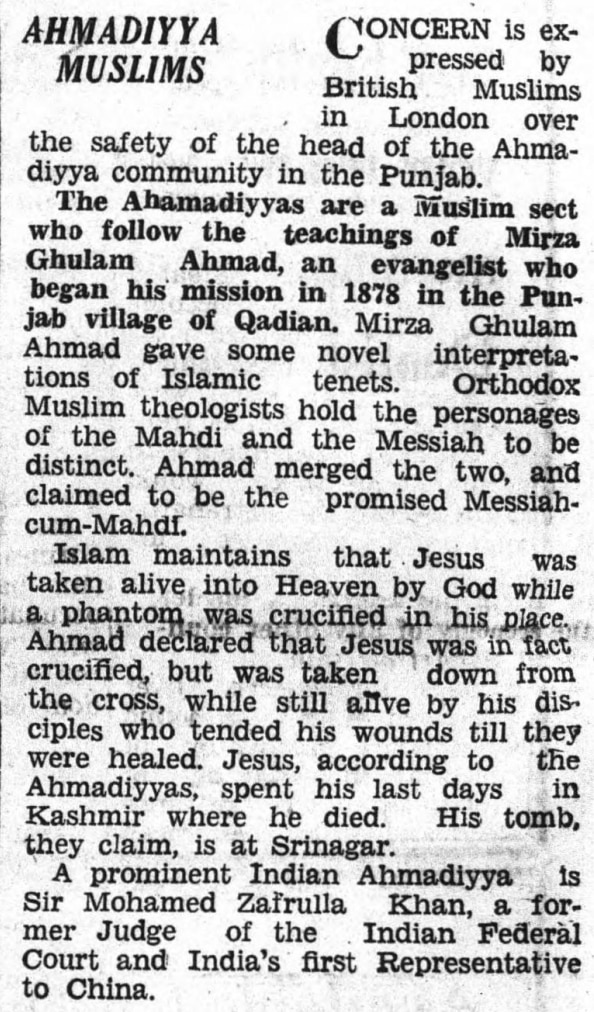Ata-ul-Haye Nasir, Ahmadiyya Archive & Research Centre
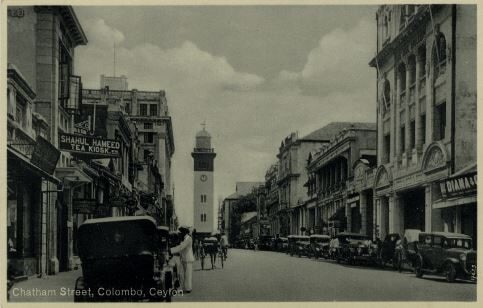
Ahmadiyyat in Ceylon
Ceylon, now Sri Lanka, is among those fortunate countries where the seed of Ahmadiyyat was planted during the lifetime of Hazrat Mirza Ghulam Ahmadas, the Promised Messiah and Mahdi. It was during his lifetime that some people accepted Ahmadiyyat, and his message particularly reached those people through some of his own writings and The Review of Religions. In 1915, Hazrat Musleh-e-Maudra sent Sufi Ghulam Muhammad Sahib to Mauritius as a missionary, and during his journey, on 14 March 1915, he visited Ceylon and stayed there for 3 months. Through his efforts, 15 people accepted Ahmadiyyat, and the system of Jamaat was established there. (“Ahmadiyya Muslim Mission in Sri Lanka [formerly Ceylon]”, www.ahmadipedia.org)
It is reported in Tarikh-e-Ahmadiyyat that Hazrat Munshi Muhammad Haider Khan Sahib of Banglore took bai‘at in 1897 (Tarikh-e-Ahmadiyyat, Vol. 1, p. 647) and went to Ceylon, where he propagated the message of Islam Ahmadiyyat and distributed literature of the Jamaat there. In a letter of early 1908, he wrote to the Promised Messiahas and mentioned some individuals who accepted the Promised Messiahas, and some who had a keen interest in the message of the Promised Messiahas. He mentioned an individual named Abdul Azeez, who was the president of a Muslim anjuman there, who later accepted Ahmadiyyat through a letter. (Badr, 9 April 1908, p. 4)
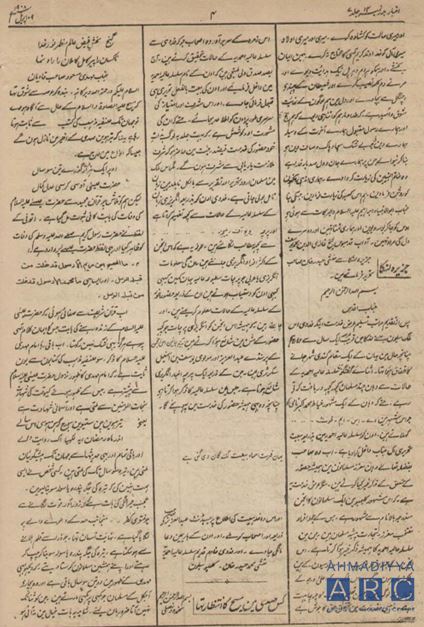
Letter to the Promised Messiahas from Abdul Azeez Sahib
In this letter, I.L.M. Abdul Azeez Sahib has been mentioned, who sent a letter to the Promised Messiahas in 1908, and stated:
“49A, Messenger Street,
“Colombo, 29th February 1908, (Friday).
“My Blessed Master,
“For the last two years I have been reading the articles which appeared in the ‘Review of Religions’ from and about you, and your mission, and the last of them is the paper written by you and read before the Religious Conference held recently at Lahore [in December 1896] under the auspices of the Arya Samaj. The more I know of you and your words the more I am convinced of your sincerity and of the truth of your mission. Therefore I think I should, for my own spiritual benefit, enter your fold, and become a disciple of yours. I pray that I may be permitted to enter into your discipleship, and I further pray that I may be informed of the rules that I have to observe. As a special favour, I beg that your Holiness will condescend to pray for my long and happy life and to have my knowledge, happiness and means increased manifold. I have a wife and six children on whom please confer your blessings.
“I am conducting a magazine called the ‘Muslim Guardian’ in English and Tamil.
“Hoping to hear soon of your acceptance of me as a disciple, and to receive the benefit of your prayer and blessings.
“I remain,
“Dear Master,
“Your humble disciple
“I. L. M. Abdul Azeez” (The Review of Religions, Vol. XV, December 1916, pp. 467-468)
In 1920, Hazrat Musleh-e-Maudra said:
“The name of the Promised Messiahas had spread all over the world within a few years, and there is no part where his name has not yet reached. Look at that town [of Qadian] and then ponder over the fame it has attained through the Promised Messiahas. […] Now, by the sheer grace of God Almighty, there are clear indications of the propagation of Islam [all over the world]. Our missionary would have reached America by now, insha-Allah. Similarly, there is progress in Africa and Ceylon, and propagation [of Islam] is going on in Germany. […] Islam is progressing in Russia as well.” (“All Ahmadis must preach Islam to the world: Hazrat Musleh-e-Maud’s advice to the Jamaat”, www.alhakam.org)
At another instance, Huzoorra said, “As God had foretold in the prophecy [about Musleh-e-Maud] that ‘His fame will spread to the ends of the earth’, Allah the Almighty enabled me to establish Ahmadiyya missions in various countries. Hence, at the outset of my Khilafat, I established Ahmadiyya missions in England, Ceylon and Mauritius, and then this [initiative of establishing missions] continued to flourish and progress.” (Anwar-ul-Ulum, Vol. 17, p. 149)
Message of Ahmadiyyat in Ceylonese periodicals
The message of Islam Ahmadiyyat spread within Ceylon through various newspapers, particularly, The Times of Ceylon, which actively covered the activities of Jamaat-e-Ahmadiyya in Ceylon. Below is only a glimpse of that news coverage, which also highlights the fact that Ahmadis there faced many hardships as well.
It is worth acknowledging that these newspapers might incorporate particular perspectives pertaining to the Promised Messiah’sas claims and Ahmadiyyat, which are based on the authors’ comprehension or convictions. Consequently, such interpretations should not be misconstrued as a comprehensive or accurate representation of the viewpoints or beliefs espoused by the Ahmadiyya Muslim Community.
The Times of Ceylon wrote under the heading “The Ceylon Ahmadiyya Association”:
“A special general meeting of the Ceylon Ahmadiyya Association was held at their Juma Mosque Hall, Shorts Road, Colombo, on Saturday, September 6th, at 7 p.m.
“Mr. C. H. Mantara moved a resolution conveying to the Amir of Afghanistan their deep regret at the murder in Afghanistan of Moulvi Nematullah Khan, an Ahmadiyya Missionary.
“Mr. K. Omerdeen seconded.
“The resolution was unanimously adopted.
“The general meeting was then held. A letter to the proprietors of Mount Temple Estate at Gampola, adjoining the General Cemetery, asking for the allotment of a small portion of land for the Ahmadiyya burial ground was submitted. In reply, Mr. O. Shelton-Agar, part proprietor, wrote that the proprietors of the estate would consider the matter. It was resolved that the proprietors be thanked.
“A letter was read from [the] Government, permitting Moulvi Ghulam Rasool, Ahmadiyya Missionary from Mauritius, to lecture on ‘Islam’ at the Tower Hall. It was resolved that [the] Government be thanked, and to represent matters to [the] Government to withdraw entirely the restriction imposed on Ahmadiyya missionaries.
“It was resolved to resume the publication of the Association’s ‘Thuthan’ regularly from the 19th instant.
“It was resolved to announce the publication of the book ‘The Christian Doctrine of Atonement” by Dr Mufti Sadiq[ra], LL.D., and ‘The Address presented to the Prince of Wales’ by the Ahmadia community (Tamil now in Press.)
“Resolved that lectures be delivered at the Association Hall, Shorts Road, every Sunday evening.
“Mr. K. M. Hassen of Qadian.
“Mr. K. M. Hassen, was accorded a hearty welcome last Saturday by the members of the Ceylon Ahmadiyya Association. He is a student of theology at Qadian sent by the Association five years ago. He is an accomplished Urdu scholar, and is on a holiday. He will return to Qadian shortly to complete his two years’ course to qualify as a missionary of the Ahmadia community.” (The Times of Ceylon, 8 September 1924, p. 4)

The Times of Ceylon wrote under the heading “Visit of Ahmadiyya Missionary from England”:
“Moulvi Ghulam Farid Malik, M.A., late Muslim Missionary in Germany and England is a passenger on the M. M. ‘Campagne’ from Marseilles. He will break his journey in Colombo and travel overland to Qadian in the Punjab. During his stay in Ceylon he will deliver a series of public lectures at the Ahmedia Hall, Short’s Road. Representation has already been made to His Excellency the Governor to kindly withdraw the restrictions imposed on the Ahmadiyya missionary, confining their activities at their headquarters in Short’s Road, and accord the same liberty enjoyed by other religious bodies.” (The Times of Ceylon, 4 November 1924, p. 7)
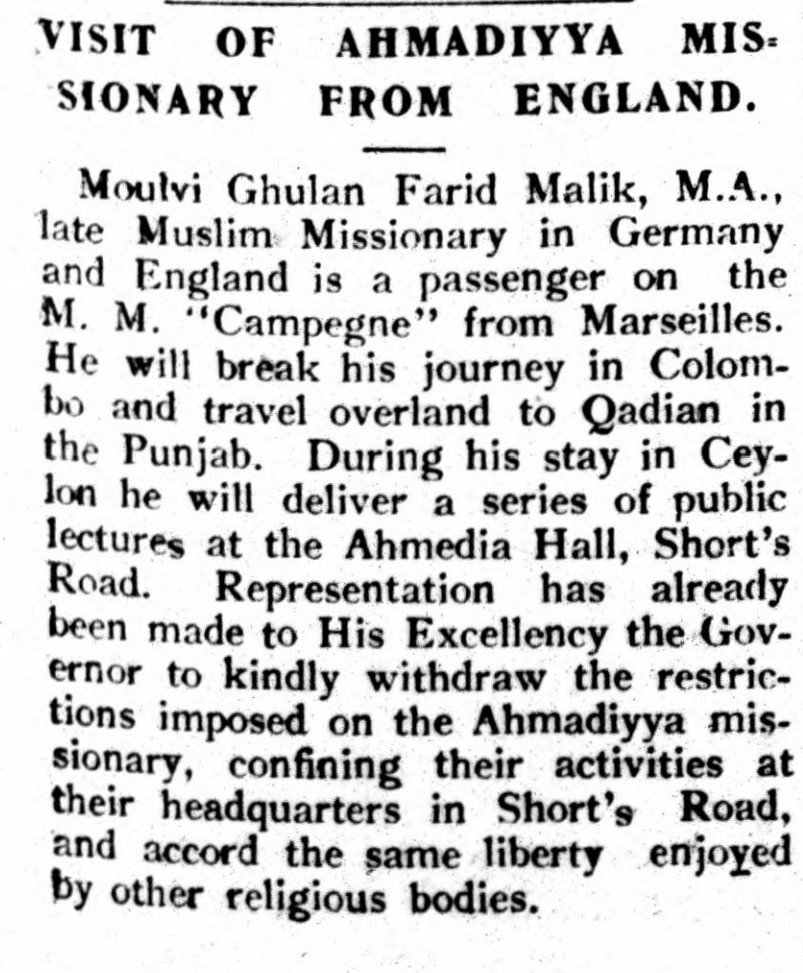
Mentioning the opposition to Ahmadiyyat in Ceylon, The Times of Ceylon wrote under the heading “The Ceylon Ahmadiyya Association — Government Restrictions on Missionaries”:
“The monthly meeting of the Ceylon Ahmadiyya Association was held on Saturday, at 7 pm.
“The Secretary read the minutes of the last meeting and the Treasurer submitted the statement of accounts, which was adopted. He read the letter from Government:
“Colonial Secretary’s Office, Colombo, 14th November, 1924.
“The Hon. Secretary, Ceylon Ahmadiyya Association, Colombo.
“Sir,—In continuation of the acknowledgment of your letter of the 27th October, 1924, addressed to His Excellency the Governor, I am directed to inform you that His Excellency is not prepared at present to withdraw the conditions under which Ahmadiyya missionaries are allowed to enter Ceylon.
“2. I am to add that in case of a visit by an Ahmadiyya missionary, the question of allowing him to deliver a public lecture, provided that it is not in the open air, will be considered if application for such permission is made.—I am, &c., L. A. Northcroft, for Colonial Secretary.
“Mr. O. A. Majeed [Osman Abdul Majeed Sahib], the Imam of the Mosque, said that it was unreasonable that Government should adhere to the order made in 1915 during the martial law days, and with holding the religious liberty of His Majesty’s British subjects in not granting the rights of their missionaries.
“The Ahmadiyya missionaries were accorded fitting reception at the recent Religious Conference at Wembley [sic., Imperial Institute] in England, but in Ceylon, they were denied the privilege. Though they were a religious body, their missionaries were not allowed to land in Ceylon during the martial law days. After the withdrawal of martial law their missionaries, though allowed to land, had to confine their activities to the Ahmadiyya Hall in Colombo, and special permission was granted from [the] Government to lecture in public places. For these concessions they were deeply thankful to [the] Government. The Government could not be entirely blamed for withholding their rights. The Buddhists and the Christians were more liberal than the conservative orthodox Mohammedans, who has made representations to [the] Government to enforce this restriction. (Shame.) The Buddhists allowed them to lecture on ‘Islam’ at their Young Men’s Buddhist Association Hall in Colombo, and an Anglican missionary at Negombo offered to bury their dead in the portion of the cemetery allotted to them, but their Mohammedans brothers were hesitating still to permit them to pray freely in their mosque and use the burial ground which virtually belonged to them—(shame)—though they have the same formula of the kalima–‘Laa ilaaha illallah Muhammadur Rasoolullah—there is one God and He is without a peer, and Muhammad[sa], is His servant and His apostle.’ In conclusion, be submitted that the proceedings of this meeting be submitted to His Excellency the Governor with a prayer that before he leaves Ceylon he may be pleased to withdraw the restrictions imposed on the Ahmadiyya missionaries.
“Mr. Habibullah Khan said that the feelings of the orthods Muslims were not inimical today as they were ten years ago, and the restrictions might not be removed for many years more and therefore he proposed that the Hon. Mr. Victor Corea be approached to ask in the Legislative Council what was the reason for this restriction, with a view to withdraw the order.
“This was agreed to.
“A letter was read from Mr. Oliver Shelton Agar, stating that the owners were not willing to grant or sell any land to any community for the purpose they required it (that is for the burial ground.)
“It was moved that the Government be asked to acquire a portion of the estate adjoining the General Cemetery at Gampola as at Negombo.
“Ahmadiyya Jalsa (Congress.)
“Resolved that the Ahmadiyya annual Jalsa or Congress meeting be held this year at Negombo on December 25th, and all Ahmadis, including ladies and children, be present at the meeting.
“It was resolved that the election of office-bearers for 1925 be held at the Ahmadiyya Hall, on January 1st.” (The Times of Ceylon, 26 November 1924, p. 13)

The Times of Ceylon wrote under the heading “The Ahmadiyya Muslims”:
“The stoning to death in Afghanistan of Ahmadiyya Missionaries has served to call attention to this small, but very energetic, sect of Islam. The Ahmadiyya movement bears some analogy to the rise of Christianity, inasmuch as its Founder, Mirza Ghulam Ahmad[as], claimed, and is believed by his followers, to be the Promised Messiah and the Mahdi of the Muslims in whom all hopes and prophecies of Islam concerning its final triumph, and greatness are to be fulfilled. There is a tradition of the Holy Prophet[sa] which says that ‘in the beginning of every century of the Muslim era God will raise one who will reform the faith.’ In 1880, Mirza Ghulam Ahmad[as], who had hitherto been regarded merely as a great Muslim teacher, announced himself as the predicted Reformer of the Faith. He later laid claim to be the second Messiah, both of Christians and Muslims, asserting that he and Jesus[as] were two parts of one and the same essence. The new Prophet attracted a number of adherents who, however, at his death in 1908, formed an infinitesimal proportion of the total of Muslims, the aggregate being estimated at less than half a million. The Ahmadiyya sect has, since the death of the reformer, shown great missionary activity and is somewhat more numerous today. The movement was introduced into Ceylon about ten years ago and has since made fairly rapid headway, branches being established in different parts of the country. It has, however, not as yet in Ceylon secured sufficient support for the establishment of a Mosque, and its devotees have to content themselves with holding their services in the most suitable place they can find for the purpose. The new sect is of, perhaps, greater interest than it would otherwise be because, from its very essence and origin, it is predisposed to reconciliation with the Christian religion, Ahmad[as] having claimed to be not only the Mahdi and Messiah of the Muslims, but also the promised second Messiah of the Christians. The aim of the Ahmadiyya movement is universal and claims to embody in itself, the fulfilment of the hopes not of Muslims only but of other religions. This characteristic of the new religion [sic., Jamaat] is evidenced by the breadth of view and tolerance of spirit displayed by its followers. In India the Ahmadiyya sect is marked by its friendliness towards British rule and its discouragement of political agitation. The activity of the sect in the propagation of its views has naturally brought it up against severe opposition, which has taken a very violent form in Afghanistan, and it is not unlikely that we shall hear of further impacts between it and orthodox Islam.” (The Times of Ceylon, 5 March 1925, p. 6)

The Times of Ceylon wrote under the heading “Visit of an Ahmadiyya Missionary”:
“Moulvi Ghulam Mohamed. B.A., Ahmadiyya Missionary of Mauritius, is returning by the s.s. ‘Janus’ from Mauritius with his family to Qadian, in the Punjab, and will be staying in Ceylon for some time. He was the first Ahmadiyya Missionary to Ceylon in 1915 and the founder of the Ceylon Ahmadiyya Association.” (The Times of Ceylon, 20 July 1926, p. 7)
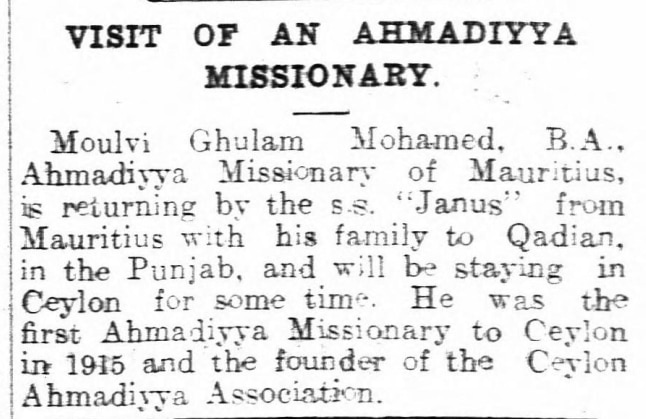
Reporting on the inauguration of the Fazl Mosque in London, The Times of Ceylon wrote under the heading “New London Mosque Opened: Members of Parliament Present”:
“London, Oct. 3rd, 7-20 p.m.
“The long efforts of the Ahmadiyya sect of Moslems to establish a worthy centre in England were consummated today at the opening of the Mosque in Southfields, in south-west London, in the presence of large crowds of Moslems from throughout the world and Members of the House of Commons and other distinguished persons.
“The Mosque should have been opened by Emir Feisal, the son of Ibn Saud, and there was general disappointment among the faithful when it was announced that Emir Feisal had been forbidden by his father to attend.
“[Sir Sheikh] Abdul Qadir, an ex-Minister of the Punjaub Government, performed the ceremony.
“He declared that he hoped that the Mosque was merely the beginning and that a bigger Mosque would be built later.—(Reuter’s Special Service to The Times of Ceylon.)
“Why the Amir did not Attend
“Misled by Erroneous Press Report
“London, Oct. 2nd.
“The confusion of the Emir Feisal’s position vis a vis the opening of the Mosque appears to have arisen owing to erroneous statements appearing in the Press, which were reproduced in Egypt, and based on the mistranslation of a statement attributed to the Imam of the Mosque that the Mosque would be open to Christians. The statements became known at Mecca, resulting in the Emir Feisal’s receipt of an interdiction to open the Mosque. But explanations have been sent to Mecca which, it is hoped, suffice to clear up the misunderstanding.
“The King will give a private audience to Emir Feisal on October 9th—(Reuter’s Special Service to The Times of Ceylon via Bombay).
“Scene at the Mosque
“Maharajah of Burdwan’s Tribute
“[‘Times of Ceylon’ Exclusive Service.]
“(Telegram Copyright Ordinance, 1898.) Received Oct. 4th, ll-30 a.m.
“London, Oct. 3rd.
“Until the last moment the Emir Feisal’s presence at today’s opening ceremony at Southfields was firmly expected.
“Audible murmurs of disappointment accompanied the reading of the notice posted at the entrance, signed by Imam Dard[ra], stating that much against his will the Emir Feisal had been forbidden to attend and announcing the substitution of Abdul Qadir.
“The day was overcast with occasional bursts of sunshine. Hours before the opening large crowds filled the roads adjacent to the white minaretted and gaily beflagged building.
“Abdul Qadir was preceded by the Maharajah of Burdwan. He received a great ovation and was received by the Imam, who read prayers and a long cable from the Head of the Ahmadiyya communities [Hazrat Mirza Bashir-ud-Din Mahmud Ahmadra] all over the world.
“The Imam explained at length that the Emir Feisal’s absence was due to a misunderstanding.
“Loud cries of ‘Allah’ went up as Abdul Qadir opened the doors of the Mosque, after which the whole party proceeded to a marquee, where speeches were delivered.
“Abdul Qadir, after regretting the Emir Feisal’s absence, declared that though he was not an Ahmadiyya he was glad to open the Mosque.
“He dwelt on the great qualities of the Ahmadiyyas and said that no religion existed without sects and Islam was no exception.
“The Maharajah of Burdwan stated that he felt it his duty and privilege to attend, although he was a non-Moslem. As regards Hindu-Moslem differences the Maharajah said it should be remembered that differences were on the question of religion and were not connected with mundane matters.
“What was happening in India, he said, was only a passing phase, as the hearts of the Hindus and Moslems were sound.
“On the conclusion of speeches and tea the voice of the Muezzin was heard for the first time in London and Moslems after ablutions entered for prayer.—(Times of Ceylon Exclusive Service — Copyright.)” (The Times of Ceylon, 4 October 1926, p. 7)

The Times of Ceylon wrote under the heading “Founder of the Ahmadiyya Movement”:
“Dr. Mufti Sadiq[ra], D.D., L.L.D., delivered an interesting lecture on ‘Ahmad[as], the Founder of the Ahmadiyya Movement, in Islam’, at the Theosophical Library, Borella, on Sunday. Dr. Sadiq[ra] will deliver a public lecture on ‘The Message of Islam to the Nations’ at the Town Hall, Kandy, today, Mr. Geo. E. de Silva will preside. Dr. Sadiq[ra], will speak on ‘Buddhism from the Islam Point of View,’ at the Y.M.B.A., Kandy, tomorrow.” (The Times of Ceylon, 25 October 1927, p. 7)
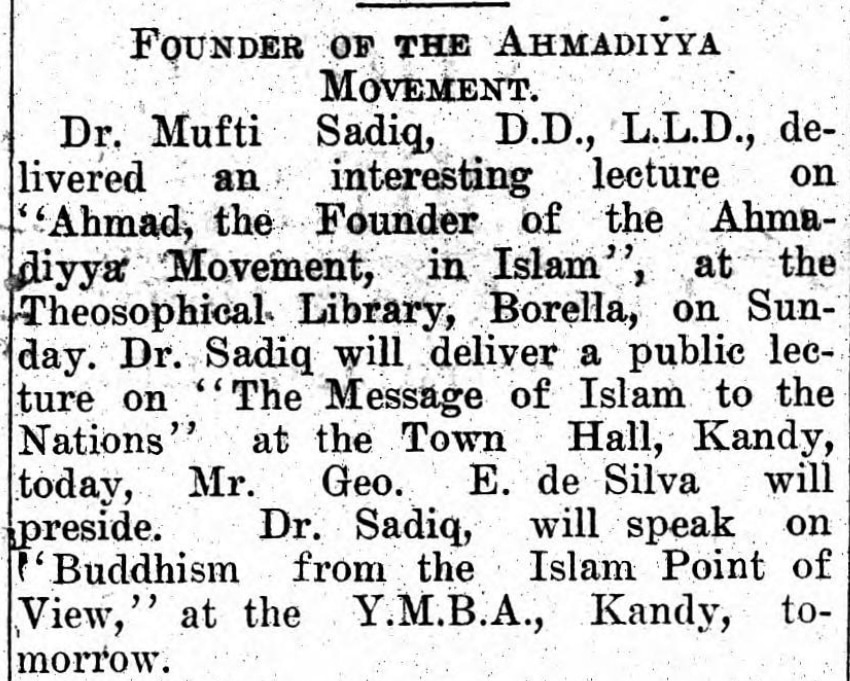
The Times of Ceylon wrote under the heading “Ahmadiyya Congress”:
“The fourteenth annual Ahmadiyya Jalsa (Congress) was held at the Gampola Recreation Ground on December 25th at 10 a.m. There were present delegates from Colombo, Kandy, Matale, and other parts of the Island. Mr. C. H. Mantara presided.
“The President said that they were pleased to hear of the progress of our King-Emperor, for whose recovery the Ahmadis were praying.
“The President then delivered his presidential address.
“In the course of his address, he said that the alteration of the existing law and customs of the Mohammedans was a violation of their rights. The introduction of Kaziz was novel. There were no Kaziz in British India. The proposed law should be withdrawn. The code of 1803 was sufficient for all time.
“An attempt should be made by [the] Government to allot to Ceylonese land now lying uncultivated. Agriculture and industries would make the people happy and reduce unemployment.
“Free schools should be provided by [the] Government and education made compulsory. […]
“Mr. T. K. Lye presided over the afternoon session.
“Mr. A. H. Sookia, of Mauritius, spoke on ‘The Powers of Nature existing in the Universe as angels, devils, heaven, and hell.’”(The Times of Ceylon, 28 December 1928, p. 14)
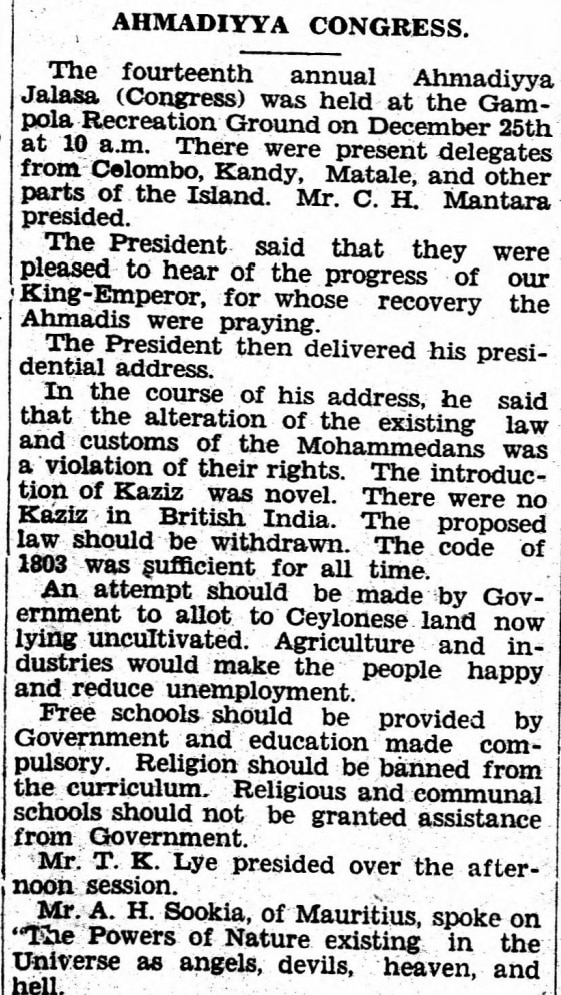
On 21 December 1932, The Times of Ceylon published the detailed programme of the upcoming Jalsa Salana of Jamaat-e-Ahmadiyya Ceylon, and wrote under the heading “Ceylon Ahmadiyya Jalsa”:
“The Katib [sic., khatib] of the Ahmadiyya Mosque announced after the Friday Juma Prayers that the seventeenth annual Jalsa (Congress) will be held at their Negombo New Mosque premises on Sunday [25 December], from 9 a.m. to 6.30 p.m. Delegates from all parts of the Island will be represented. The President Mr. Syed Ahmad of Satankulam in India will preside.” (The Times of Ceylon, 21 December 1932, p. 9)

This was followed by a detailed programme of the Jalsa. (Ibid)
The Times of Ceylon wrote under the heading “Prince’s Adviser”:
“Sir Muhammad Zafrulla Khan[ra] who is representing certain Indian Princes in London is a former judge of the Indian Supreme Court.
“Like Sir Ramaswami Mudaliar he made his mark as a delegate to the Indian Round Table Conferences where his ready grasp of intricate constitutional detail attracted attention. Lord Linlithgow relied greatly on Sir Muhammad’s[ra] advice during his Viceroyalty. This able administrator served as a member of the Governor-General’s Executive Council for six years from 1935 to 1941. He was incidentally India’s first Agent-General in China.
“Sir Muhammad comes of an interesting Muslim sect, some of whose tenets are not accepted by orthodox Muslims. He is an Ahmadiyya, a follower of the teachings of Mirza Ghulam Ahmad[as] who around 1878 started a new movement in Islam at Qadian in the Punjab. Mirza Ghulam Ahmad[as] claimed to be the Promised Messiah. He also held that Jesus[as] was taken down from the Cross while still alive by his disciples, had his wounds attended to, and later made his way to Kashmir where he died. The Ahmadiyyas maintain that Jesus’[as] tomb is in Srinagar. This Muslim Messiah died in 1908.” (The Times of Ceylon, 3 July 1947, p. 6)
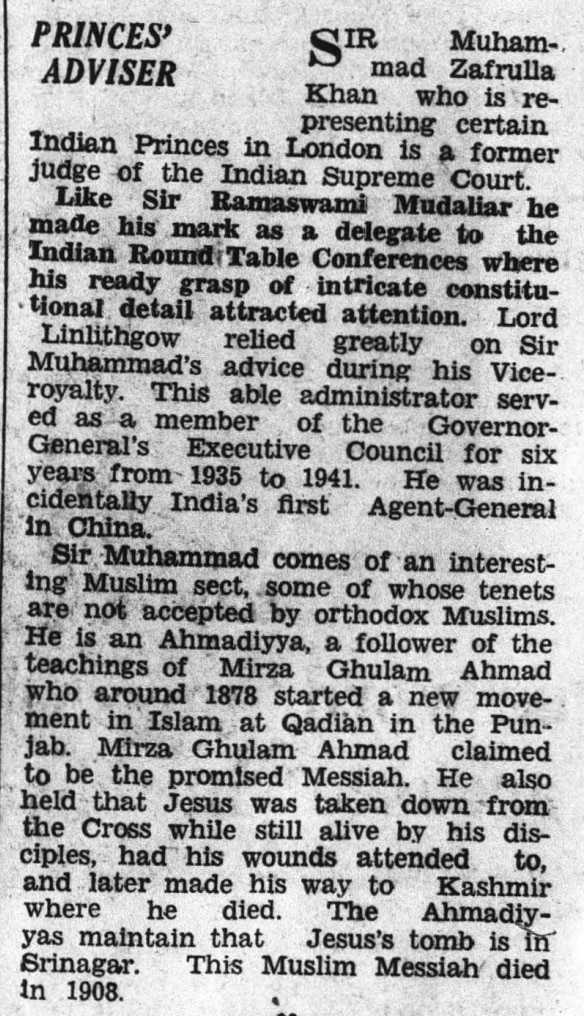
The Times of Ceylon wrote under the heading “Ahmadiyya Muslims”:
“Concern is expressed by British Muslims in London over the safety of the head of the Ahmadiyya community in the Punjab.
“The Ahmadiyyas are a Muslim sect who follow the teachings of Mirza Ghulam Ahmad[as], an evangelist who began his mission in 1878 in the Punjab village of Qadian. Mirza Ghulam Ahmad[as] gave some novel interpretations of Islamic tenets. Orthodox Muslim theologists hold the personages of the Mahdi and the Messiah to be distinct. Ahmad[as] merged the two, and claimed to be the Promised Messiah-cum-Mahdi.
“[Non-Ahmadi followers of] Islam maintain that Jesus[as] was taken alive into Heaven by God while a phantom was crucified in his place. Ahmad[as] declared that Jesus[as] was in fact crucified, but was taken down from the cross, while still alive by his disciples who tended his wounds till they were healed. Jesus[as], according to the Ahmadiyyas, spent his last days in Kashmir where he died. His tomb, they claim, is at Srinagar.
“A prominent Indian Ahmadiyya is Sir Mohamed Zafrulla Khan[ra], a former Judge of the Indian Federal Court and India’s first Representative to China.” (The Times of Ceylon, 2 September 1947, p. 6)
